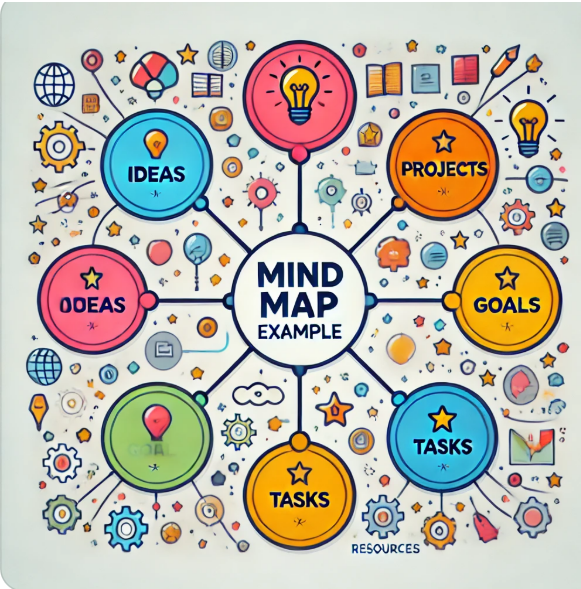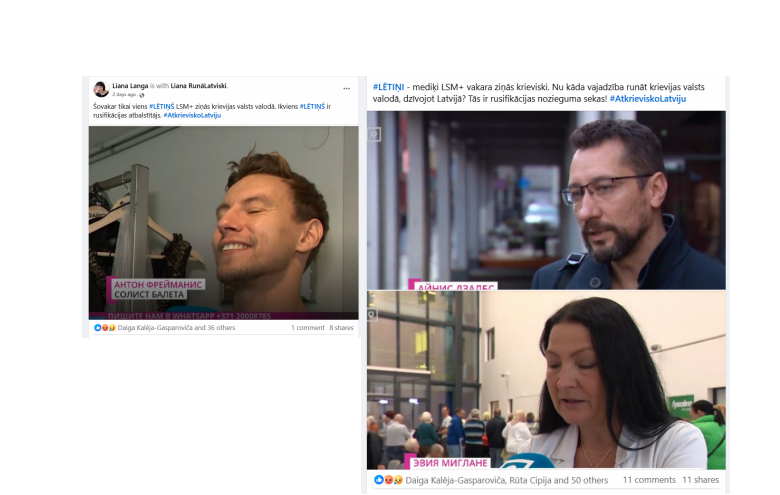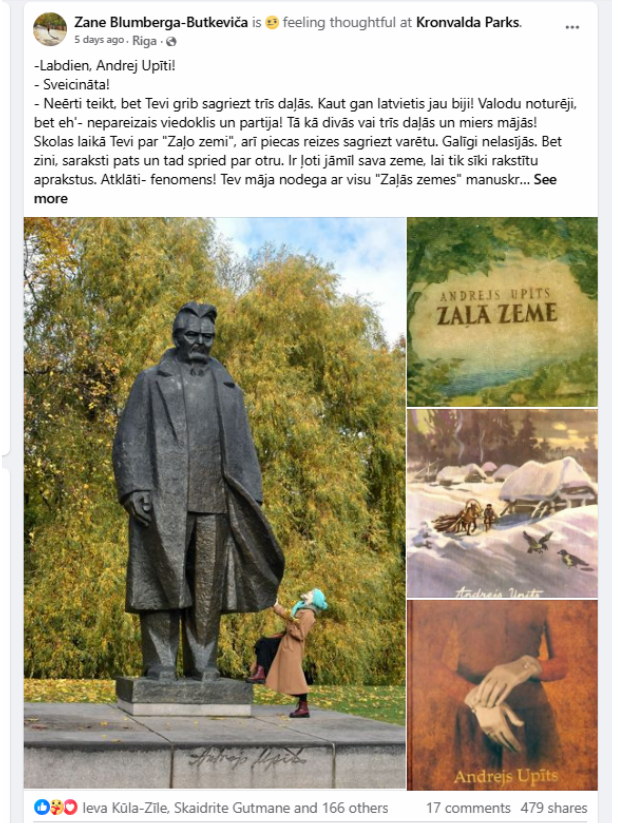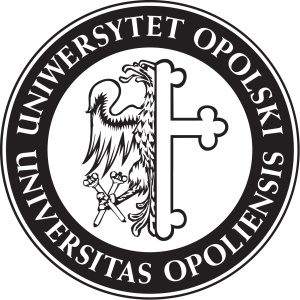Module 5 Part 6
Completion requirements
Task 1 (20 min)
GROUP DISCUSSION
Discuss in a group and create a mind map. Answer the following questions:
What are the risks for people in a country who choose to act according to their conscience rather than following the majority opinion?
How can a person balance staying true to their values while navigating societal pressures to conform? What strategies can help individuals maintain their integrity in challenging situations?
In what ways might questioning commonly accepted beliefs or traditions contribute to personal growth and societal change? What potential challenges and rewards might a person face in this process?
Example:

Task 2 (35 min)
Description of a situation
In May 2022, three months after the start of Russia’s war in Ukraine, Latvian poet Liāna Langa launched a social campaign titled "Speak Latvian! De-Russify Latvia." The campaign aims to reduce Russian influence, language, and cultural presence in Latvian public spaces, advocating for a process of de-Russification. This term refers to the effort to decrease Russian impact, which had grown during the Russification efforts both before and after Latvia regained independence. Langa shares her views on her social media platform "X" (formerly Twitter), where she highlights the importance of this campaign. The initiative has generally been well-received in Latvian society, where many feel that the widespread use of Russian, both in schools offering minority programs and in urban areas and media, has hindered the integration of Russian speakers into Latvian society.
Reflect on the role of language in national identity.
How can language influence the integration or division of communities within a country?
Analyze the impact of social campaigns like "Speak Latvian! De-Russify Latvia" on minority language communities.
What are such campaigns' potential benefits and drawbacks in multicultural societies?
Write a personal response on the importance of maintaining a national language versus promoting multilingualism in a country. How might this apply to Latvia’s situation?
Task 3 (30 min)
Description of situation
As a result of the campaign, there has been a tendency to go to extremes “Witch hunt”, with all news and broadcasts closely monitored. Nearly every day, pictures are published of people responding in Russian to public media that produce content in Russian. One person who was publicly shamed for this explained, "The fact that I am Latvian and responded to Russian media in Russian does not mean that I support the war in Ukraine or that I am not a patriot of Latvia. In my view, it is crucial to discuss events in Latvia in Russian, especially when they counter Russian propaganda, as this is one of the most effective ways to combat misinformation and fake news.

Screenshots from Facebook: https://www.facebook.com/liana.langa (03.11.2024.)
Prepare arguments for and against the viewpoint that engaging with Russian media in the Russian language can help counteract propaganda. Discuss whether this approach can coexist with the goals of de-Russification.
Investigate how other countries with significant minority language populations balance promoting the national language and allowing minority language use in media.
What strategies are used to foster both integration and cultural preservation?
Analyze how language choice in media can influence perceptions of loyalty, patriotism, and resistance to propaganda. Consider the challenges in using one language to counter the narratives spread by another language’s dominant media.
Reflect on the role of language as a tool for resisting misinformation.
How can using a minority language serve as a form of resistance, and what risks or misunderstandings might arise from this approach?
Task 4 (35 min)
Description of a situation
To sever any remaining connections with Russia and the remnants of the Soviet Union, the next step involved addressing cultural symbols tied to Soviet influence. For example, there is now a movement to remove monuments dedicated to writers who were seen as loyal to the Soviet regime. However, some argue that it was nearly impossible to live and work during Soviet times without displaying some level of loyalty. This has sparked concern among educated Latvians, as there are plans to dismantle the monument of Latvian writer Andrejs Upītis, whose contributions to Latvian literature are significant. Posts on Facebook reflect the growing tension: "IMPORTANT: Many thanks to those who have already signed! An unprecedented attack on monuments and national cultural values is underway in Latvia. I have prepared a public appeal to the highest officials and institutions in the country, demanding action to stop this vandalism and preserve our cultural and historical heritage, which belongs to the entire nation, not a handful of misguided MPs. Thank you to Dr Iur. Ringolds Balodis and Dr. Philol. Viesturs Vecgrāvis for assisting with this public call! Many socially active and responsible individuals—writers, musicians, artists, educators, and representatives from various fields—have already signed this appeal, with the list continuing to grow. I will add the full list of signatories when the petition is sent to the authorities. I encourage everyone to stand up and support this cause! If you'd like to join as a signatory, please comment 'I sign' or message me privately on Messenger."
Source: https://www.facebook.com/zane.blumberga.1)

Screenshots from Facebook: https://www.facebook.com/zane.blumberga.1 (03.11.2024.)
Discuss the implications of removing monuments tied to Soviet-era figures. What are this approach's potential benefits and drawbacks to cultural heritage and historical memory? Divide into two groups to debate whether removing Soviet-era monuments effectively promotes national identity. One side should preserve monuments as historical artefacts, while the other argues for their removal to reinforce Latvia's independence from past influences.
Write a reflection on how your country deals with cultural symbols tied to complex or controversial histories.
How would you feel about removing monuments related to challenging past events or figures?
Imagine you are a cultural advisor to the Latvian government.
Write a proposal with alternative solutions to address Soviet-era monuments that balance respect for history with promoting Latvian cultural identity.
Task 5
Reflection Questions
How can a nation balance cultural preservation with inclusivity when addressing the presence of a minority language?
How can a society prevent misunderstandings between patriotism and language choice, especially in a politically sensitive context?
What are the arguments for and against removing monuments associated with Soviet-era figures, particularly in the context of Latvian cultural heritage?

GROUP DISCUSSION
Discuss in a group and create a mind map. Answer the following questions:
What are the risks for people in a country who choose to act according to their conscience rather than following the majority opinion?
How can a person balance staying true to their values while navigating societal pressures to conform? What strategies can help individuals maintain their integrity in challenging situations?
In what ways might questioning commonly accepted beliefs or traditions contribute to personal growth and societal change? What potential challenges and rewards might a person face in this process?
Example:

Task 2 (35 min)
Description of a situation
In May 2022, three months after the start of Russia’s war in Ukraine, Latvian poet Liāna Langa launched a social campaign titled "Speak Latvian! De-Russify Latvia." The campaign aims to reduce Russian influence, language, and cultural presence in Latvian public spaces, advocating for a process of de-Russification. This term refers to the effort to decrease Russian impact, which had grown during the Russification efforts both before and after Latvia regained independence. Langa shares her views on her social media platform "X" (formerly Twitter), where she highlights the importance of this campaign. The initiative has generally been well-received in Latvian society, where many feel that the widespread use of Russian, both in schools offering minority programs and in urban areas and media, has hindered the integration of Russian speakers into Latvian society.
Reflect on the role of language in national identity.
How can language influence the integration or division of communities within a country?
Analyze the impact of social campaigns like "Speak Latvian! De-Russify Latvia" on minority language communities.
What are such campaigns' potential benefits and drawbacks in multicultural societies?
Write a personal response on the importance of maintaining a national language versus promoting multilingualism in a country. How might this apply to Latvia’s situation?
Task 3 (30 min)
Description of situation
As a result of the campaign, there has been a tendency to go to extremes “Witch hunt”, with all news and broadcasts closely monitored. Nearly every day, pictures are published of people responding in Russian to public media that produce content in Russian. One person who was publicly shamed for this explained, "The fact that I am Latvian and responded to Russian media in Russian does not mean that I support the war in Ukraine or that I am not a patriot of Latvia. In my view, it is crucial to discuss events in Latvia in Russian, especially when they counter Russian propaganda, as this is one of the most effective ways to combat misinformation and fake news.

Screenshots from Facebook: https://www.facebook.com/liana.langa (03.11.2024.)
Prepare arguments for and against the viewpoint that engaging with Russian media in the Russian language can help counteract propaganda. Discuss whether this approach can coexist with the goals of de-Russification.
Investigate how other countries with significant minority language populations balance promoting the national language and allowing minority language use in media.
What strategies are used to foster both integration and cultural preservation?
Analyze how language choice in media can influence perceptions of loyalty, patriotism, and resistance to propaganda. Consider the challenges in using one language to counter the narratives spread by another language’s dominant media.
Reflect on the role of language as a tool for resisting misinformation.
How can using a minority language serve as a form of resistance, and what risks or misunderstandings might arise from this approach?
Task 4 (35 min)
Description of a situation
To sever any remaining connections with Russia and the remnants of the Soviet Union, the next step involved addressing cultural symbols tied to Soviet influence. For example, there is now a movement to remove monuments dedicated to writers who were seen as loyal to the Soviet regime. However, some argue that it was nearly impossible to live and work during Soviet times without displaying some level of loyalty. This has sparked concern among educated Latvians, as there are plans to dismantle the monument of Latvian writer Andrejs Upītis, whose contributions to Latvian literature are significant. Posts on Facebook reflect the growing tension: "IMPORTANT: Many thanks to those who have already signed! An unprecedented attack on monuments and national cultural values is underway in Latvia. I have prepared a public appeal to the highest officials and institutions in the country, demanding action to stop this vandalism and preserve our cultural and historical heritage, which belongs to the entire nation, not a handful of misguided MPs. Thank you to Dr Iur. Ringolds Balodis and Dr. Philol. Viesturs Vecgrāvis for assisting with this public call! Many socially active and responsible individuals—writers, musicians, artists, educators, and representatives from various fields—have already signed this appeal, with the list continuing to grow. I will add the full list of signatories when the petition is sent to the authorities. I encourage everyone to stand up and support this cause! If you'd like to join as a signatory, please comment 'I sign' or message me privately on Messenger."
Source: https://www.facebook.com/zane.blumberga.1)

Screenshots from Facebook: https://www.facebook.com/zane.blumberga.1 (03.11.2024.)
Discuss the implications of removing monuments tied to Soviet-era figures. What are this approach's potential benefits and drawbacks to cultural heritage and historical memory? Divide into two groups to debate whether removing Soviet-era monuments effectively promotes national identity. One side should preserve monuments as historical artefacts, while the other argues for their removal to reinforce Latvia's independence from past influences.
Write a reflection on how your country deals with cultural symbols tied to complex or controversial histories.
How would you feel about removing monuments related to challenging past events or figures?
Imagine you are a cultural advisor to the Latvian government.
Write a proposal with alternative solutions to address Soviet-era monuments that balance respect for history with promoting Latvian cultural identity.
Task 5
Reflection Questions
How can a nation balance cultural preservation with inclusivity when addressing the presence of a minority language?
How can a society prevent misunderstandings between patriotism and language choice, especially in a politically sensitive context?
What are the arguments for and against removing monuments associated with Soviet-era figures, particularly in the context of Latvian cultural heritage?
Last modified: Sunday, 23 February 2025, 6:29 PM

